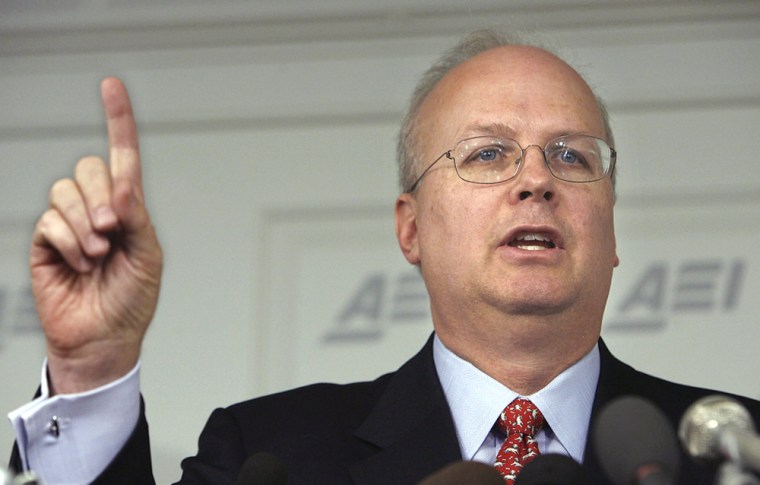WASHINGTON - Some Democrats have already celebrated the downfall of Karl Rove.
At a Michigan Trial Lawyers’ Association dinner Saturday night in Dearborn, Mich., the group's vice president Robert Raitt announced — according to the Detroit Free Press — that President Bush’s longtime strategist had just been indicted. The announcement reportedly prompted a standing ovation by the crowd of 700, which included Sen. Hillary Clinton.
Strange then that a relaxed-looking Rove – not indicted, not out on bail, and wearing a business suit, not orange prison garb -- was in person at the right-wing think tank, American Enterprise Institute Monday morning.
Rove was, as usual, nerdy in his use of statistics, and was chummy and flattering with the reporters present -- just like in 2000 when Bush was first running for president. At one point in the question-and-answer session Rove told National Public Radio’s Mara Liasson, “I love watching you on television.”
If Rove is indicted soon, as some Democrats hope and expect, then this may have been Rove’s valedictory message and the essence of it was: things are better than you, especially you in the mainstream news media, think.
The sweet and the sour
The economy is growing and Bush deserves credit for that, Rove contended. He pointed out, for example, that claims for unemployment insurance were at a five-year low and that the economy was growing at a brisk rate of nearly five percent.
But in his responses to reporters’ questions after his speech Rove summed up his and the president’s problems this way: “We’re in a sour time, I’ll readily admit it,” he said in reply to a British reporter who asked what has gone wrong with the Bush presidency.
“Being in the middle of a war where people turn on their television sets and see brave men and women dying is not something that makes people happy and optimistic and upbeat,” Rove said.
But he recalled that in the summer of 2003 he had heard dire predictions about how the 2004 election would turn out, and he insisted, “we’re going to be just fine in the fall elections and we’re going to be fine because we stand for things that are important to stand for: a strong national defense and victory, complete victory in the war on terror…. Tax cuts, free trade, fiscal restraint in the budget process.”
He added, “the war looms over everything, there’s no doubt about it.”
The cloud of Iraq
Rove repeated later in the question-and-answer session that the Iraq war was having a widespread downbeat effect on the electorate.
“The war looms on all political actors,” he said, arguing that Americans are not sour on the economy. “People’s personal circumstances are good; they’re feeling good about where they are…. They’re worried about the long haul,” he added, and specifically they’re worried about globalization and Social Security.
Evidence of voter happiness, according to Rove: the University of Michigan’s consumer confidence survey has relatively high readings. He cited a study from some political scientists (whom he didn’t name) that said with consumer confidence as high as it now is, Republicans would gain 10 more seats in Congress than they’d otherwise gain in November.
He parried a question from Liasson about why conservatives were so unhappy with Bush’s record on restraining spending. “It’s hard,” he explained, saying that Bush’s veto threats had kept Congress [from] even bigger spending increases.
“It is hard to go up there on (Capitol) Hill and say, ‘We’re asking you to absolutely cut non-security, discretionary spending.”
There was only one reminder Monday of the investigation by special counsel Patrick Fitzgerald: Rove refused to answer a question from David Corn of the Nation magazine on whether he’s leaked information about former CIA employee Valerie Plame. “Nice try, though” he told Corn.
